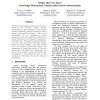Free Online Productivity Tools
i2Speak
i2Symbol
i2OCR
iTex2Img
iWeb2Print
iWeb2Shot
i2Type
iPdf2Split
iPdf2Merge
i2Bopomofo
i2Arabic
i2Style
i2Image
i2PDF
iLatex2Rtf
Sci2ools
100
click to vote
HICSS
2007
IEEE
2007
IEEE
Neither Here nor There: Knowledge Sharing and Transfer with Proactive Structuration
Information technologies hold great promise in their ability to link distributed workers, allowing organizations to take advantage of the potential benefits of effectively gathering knowledge without regard to geographic boundaries. This can be advantageous for an organization's overall capabilities, given that employing workers from diverse backgrounds can increase an organization's knowledge base. Paradoxically, these technologies may also serve to dampen knowledge sharing, unless proactively managed. This paper extends work on Adaptive Structuration Theory and sensemaking to develop the concept of Proactive Structuration. We explain how organizations and teams can proactively manage distributed work arrangements to best position the team to take advantage of knowledge sharing for enhanced performance.
Adaptive Structuration Theory | Biometrics | HICSS 2007 | Knowledge Sharing | Organization's Knowledge Base | System Sciences |
| Added | 02 Jun 2010 |
| Updated | 02 Jun 2010 |
| Type | Conference |
| Year | 2007 |
| Where | HICSS |
| Authors | Terri L. Griffith, Mark A. Fuller, Gregory B. Northcraft |
Comments (0)

